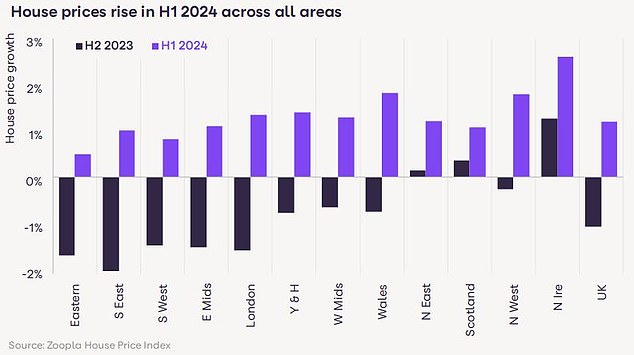Table of Contents
The property market is on the up, according to Zoopla, with sales picking up and buyers having to pay closer to asking price.
The property website said house prices have risen across all UK regions in the first six months of 2024 and are on track to end the year up 2 per cent compared with January.
The improved outlook for the market is reinforced by a higher number of properties coming on the market, according to Zoopla.
On the rise: House prices have remained broadly stable over the past 12 months, but prices are higher in all regions and the UK during the first half of 2024
The average real estate agent is said to have 33 homes for sale, which is more than at any time in the past six years.
Rather than letting homes languish on the market and forcing prices down, Zoopla says the increased level of choice for buyers is supporting more sales being made.
The number of agreed sales is 16 percent higher than a year ago, with sales up across all regions. It says agreed sales are now 22 percent higher than pre-pandemic levels.
Buyers are also paying a larger share of the asking price than last year, when higher mortgage rates crushed demand.
Zoopla says buyers are currently paying 96.8 per cent of the asking price, the highest figure for 18 months.
In real terms, this equates to homes selling for an average of £16,600 below asking price.
In October last year, buyers were paying £23,000 less than the asking price.
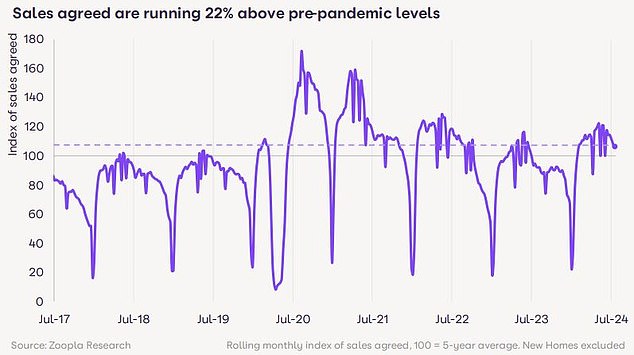
More sales: A greater supply of homes for sale and more buyers has made the number of agreed sales 16% higher than a year ago
In the long term, Zoopla says economic growth, rising household incomes and increased housebuilding will benefit home buyers, according to Zoopla.
Average incomes are estimated to rise 4.5 percent this year, and incomes are also expected to rise faster than home prices in 2025.
Richard Donnell, chief executive of Zoopla, said: ‘The housing market is starting to recover after a very cold 2023.
‘There are clear signs of growing confidence among buyers and sellers, with many more homes for sale and buyers paying a higher proportion of the asking price.
“The housing market is essentially an extension of the UK economy. Government policies focused on economic growth that fuels income growth will help support both home buyers and renters.”
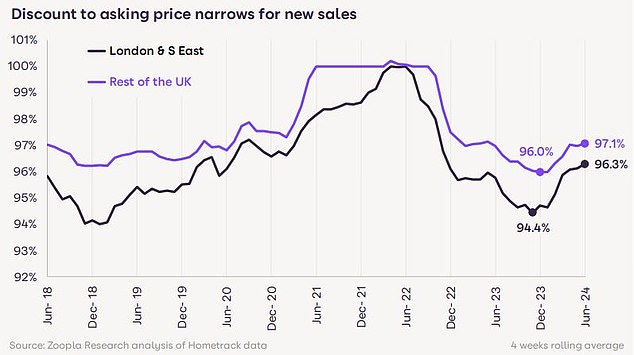
Buyers are paying a larger share of the asking price than last year, when higher mortgage rates weighed on demand.
Lower interest rates could boost real estate market
Lower mortgage rates are likely encouraging buyers and those looking to move forward with their plans this year.
Last week, the lowest five-year fixed mortgage rate fell below 4 percent for the first time since February.
According to Moneyfacts, the average five-year fixed mortgage rate across the market is currently 5.4 percent. This time last year, the average was 6.35 percent.
Zoopla says the first base rate cut will boost consumer confidence and market activity.
The next base rate decision is due at the Bank of England on Thursday and market expectations are divided on whether the first cut will come this week or in September.
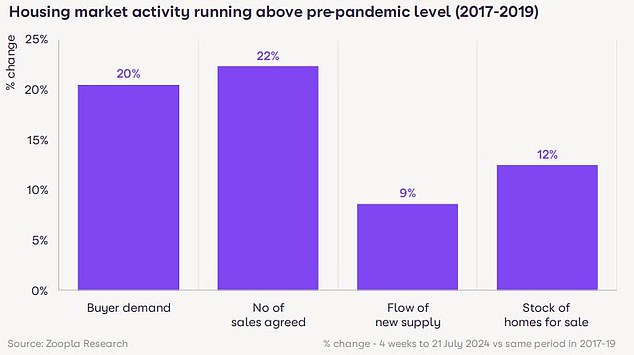
Warming up: More sellers continue to list homes. More sales are being completed and buyers are paying a larger share of the sales price as confidence improves
Net mortgage approvals for home purchases, a proxy for future borrowing, held broadly steady at 60,000 in June, according to the latest Bank of England figures, slightly below the pre-pandemic average.
Anthony Codling, head of European housing and building materials at investment bank RBC Capital Markets, sees this as a sign of a relatively cool housing market, rather than one that is warming up.
“In our view, the UK housing market appears to be stuck in a rut, waiting, hoping for the first cut in the base rate,” Codling said.
‘There is a small chance of a cut on Thursday, but we think the first cut is more likely in September.
“Once mortgage rates begin to fall, we expect housing market activity to pick up.”
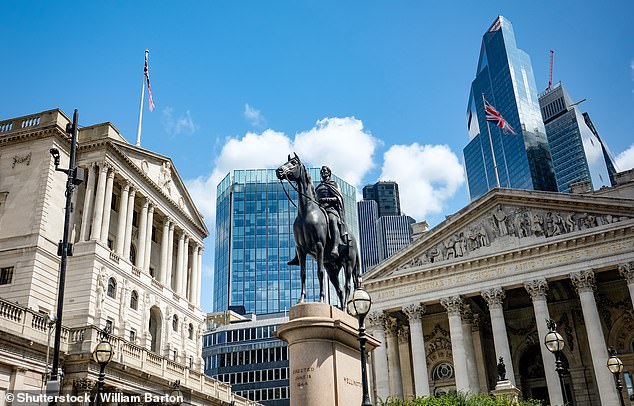
No change: Bank of England keeps base rate at 5.25% from August 2023
Simon Gerrard, managing director of estate agents Martyn Gerrard, is optimistic about the impact of the first base rate cut, but believes there are several factors that promise a return to house price growth soon.
“Inflation has held steady at the Bank of England’s 2 percent target, so there is a strong chance that the base rate will fall in August or September, which will trigger a surge in property searches that have been on hold,” Gerrard said.
From a broader perspective, it has also been a great relief to see the government prioritise the construction of new housing.
House price forecasts for 2024
At the beginning of the year, most forecasts pointed to house prices falling throughout 2024.
Zoopla itself had forecast a 2% drop at the beginning of the year and now expects house prices to rise by 2%.
Halifax expected house prices to fall by between 2 and 4 per cent. Knight Frank forecast a 4 per cent fall and Savills a 3 per cent drop on average.
Fast forward almost eight months and Knight Frank now expects house prices to rise 3 per cent this year.
Tom Bill, head of UK residential research at Knight Frank, says his current forecast should hold true, unless Rachel Reeves throws in some nasty tax rises in her autumn statement.
‘Demand and transaction volumes should pick up in the second half of the year as the first rate cut since March 2020 looms.
‘As more mortgages fall below the psychological threshold of 4 percent, we expect home prices to rise 3 percent in 2024.
‘One risk on the horizon is the possibility of tax increases in Labour’s first budget, which could dampen demand, particularly in the higher price brackets.
‘The other is the Tenancy Reform Bill, which may result in increased supply in the sales market if the new rules are punitive for landlords.’
Some links in this article may be affiliate links. If you click on them we may earn a small commission. This helps us fund This Is Money and keep it free to use. We do not write articles to promote products. We do not allow any commercial relationships to affect our editorial independence.

